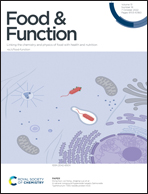Lactobacillus plantarum HNU082 alleviates dextran sulfate sodium-induced ulcerative colitis in mice through regulating gut microbiome†
Abstract
Probiotics have shown good efficacy in the prevention of ulcerative colitis (UC), but the specific mechanism remains unclear. Therefore, shotgun metagenomic and transcriptome analyses were performed to explore the preventive effect of a potential probiotic Lactobacillus plantarum HNU082 (Lp082) on UC and its specific mechanism. The results showed that Lp082 intervention ameliorated dextran sulfate sodium (DSS)-induced UC in mice, which was manifested in the increase in body weight, water intake, food intake, and colon length and the decrease in the DAI index, immune organ index, inflammatory factors and histopathological scores after Lp082 intake. The mechanism is deeply studied and it is discovered that Lp082 improves the intestinal mucosal barrier by co-optimizing biological barriers, chemical barriers, mechanical barriers, and immune barriers. Specifically, Lp082 improved the biological barrier by increasing the diversity, optimizing the species composition and the structure of the gut microbiota, increasing bacteria producing short chain fatty acids (SCFAs), and activating microbial metabolic pathways producing SCFAs so as to enhance the content of SCFAs. Lp082 optimized the chemical barrier by decreasing the mRNA expression of ICAM-1 and VCAM and by increasing the content of goblet cells and the mRNA expression and immunofluorescent protein content of mucin2. Lp082 ameliorated the mechanical barrier by decreasing the mRNA expression of claudin-1 and claudin-2, and by increasing the mRNA expression of ZO-1 and ZO-2 and the immunofluorescent protein content of ZO-1. Lp082 also optimized the immune barrier by increasing the mRNA expression of IL-10, TGF-β1, and TGF-β2 and by decreasing the mRNA expression and protein contents of IL-6, tumour necrosis factor-alpha (TNF-α) and myeloperoxidase (MPO). In addition, Lp082 can also regulate the metabolic pathways of inflammation and disease in mice, and notably, Lp082 inhibits the NF-κB signaling pathway by inhibiting NF-κB signaling molecules to alleviate UC. In conclusion, improving gut microbiota dysbiosis, protecting the intestinal mucosal barrier, regulating inflammatory and disease pathways, and affecting neutrophil infiltration are the potential mechanisms of probiotic Lp082 in alleviating UC. Our study enriches the mechanism and provides a new prospect for Lactobacillus plantarum HNU082 in the prevention of colitis, provides support for the development of probiotic-based microbial products as an alternative prevention strategy for UC, and provides guidance for the future probiotic prevention of human colitis.



 Please wait while we load your content...
Please wait while we load your content...